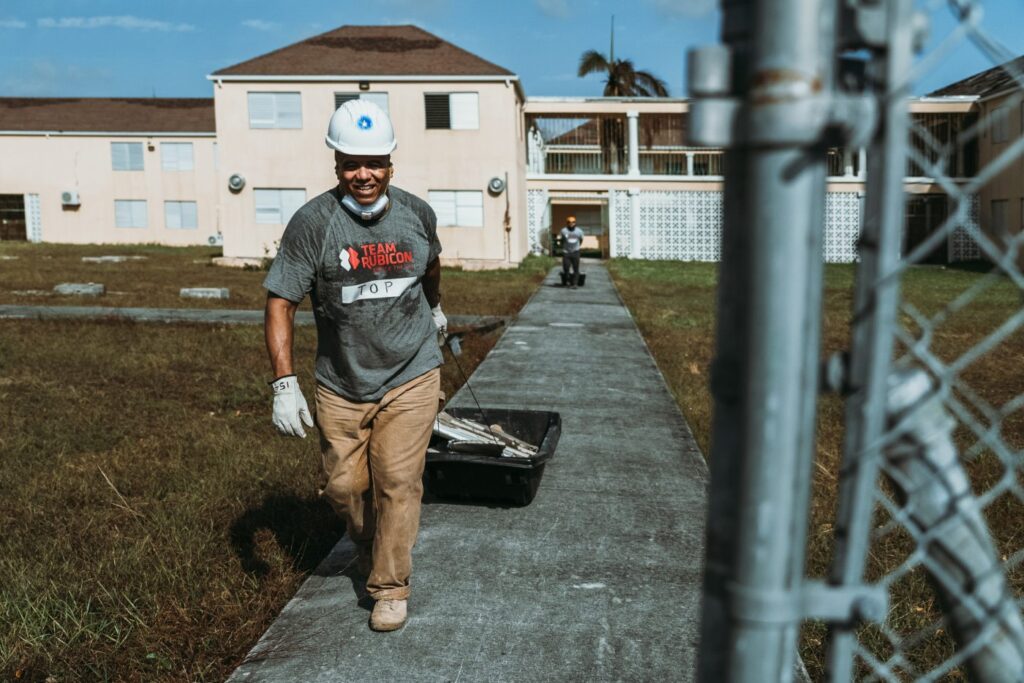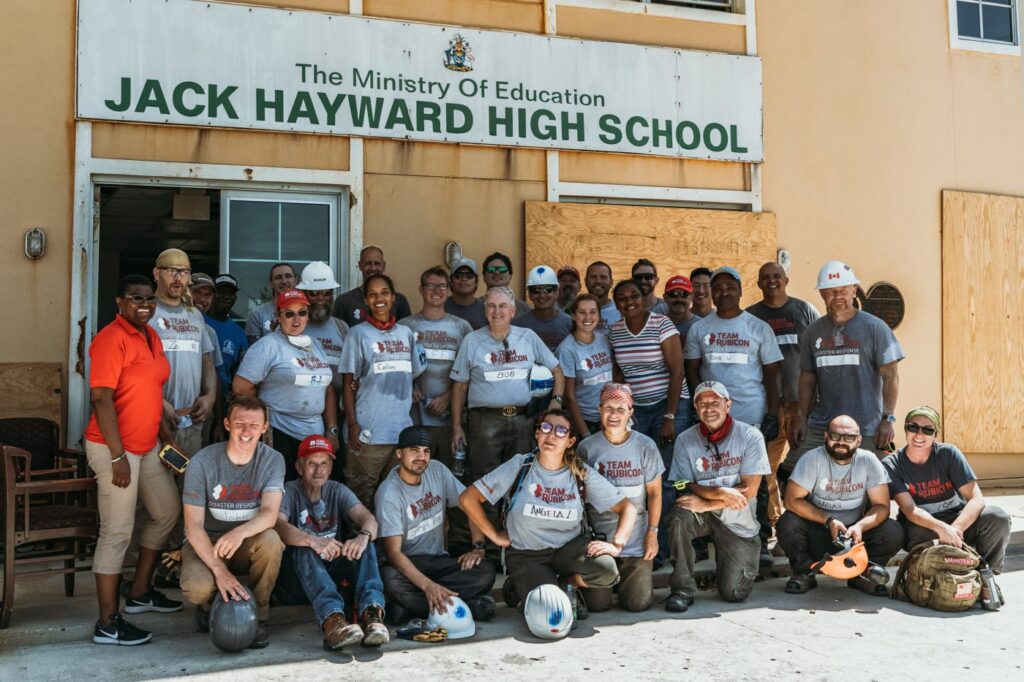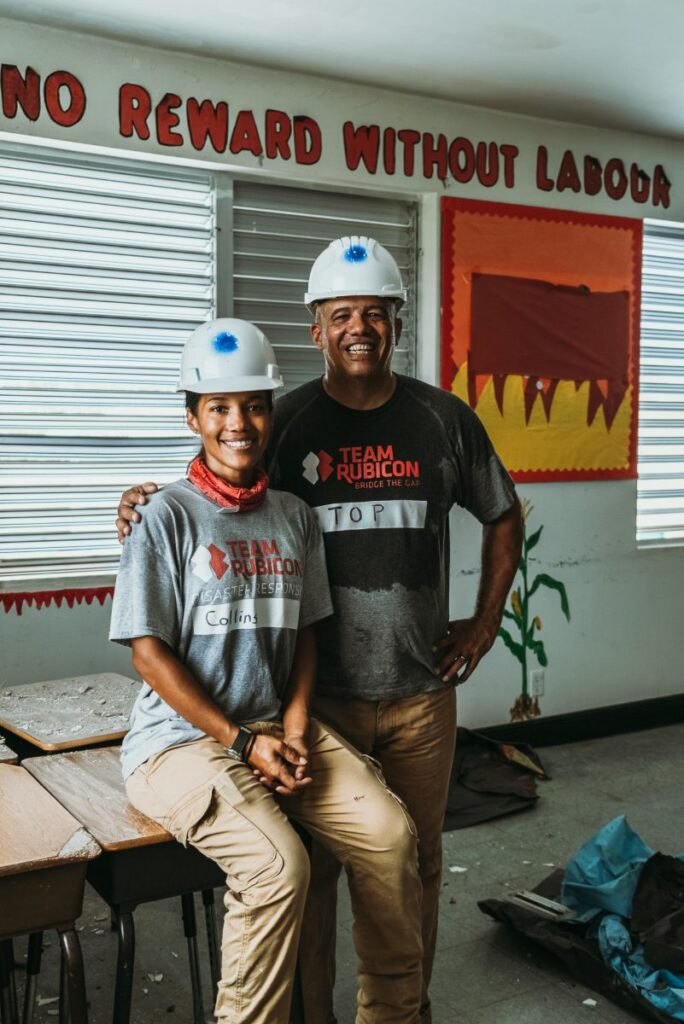Standing beside his daughter, Aja Collins, in the tropical heat of the Bahamas in the days after Hurricane Dorian, Michael “Top” Washington thought of his son. This, he imagined, must be what serving with Michael Jr. would have been like. If he’d had that chance.
Top and Aja were in the Abacos to muck houses, tear down dangerous debris, and try to help Bahamians secure some safe places to sleep and live. On her first deployment as a Greyshirt, Aja—a mother of two, Army wife, and ICU nurse—was among Team Rubicon’s initial wave of responders and had arrived first. Her father, Top, was only days behind. Turns out, Greyshirts run in the family.

Hauling sled full of Hurricane Dorian debris in The Bahamas.
Because of another child, his son, Michael, Top has been with Team Rubicon since nearly the start. Michael had been in infantry school with Team Rubicon co-founder Jake Wood. By 2006, both were in the second battalion, seventh Marine regiment, which deployed to Iraq in ’07 and then to Afghanistan in ’08. In June of that year, Michael was serving as a Marine Corps squad leader when the Humvee his squad was traveling struck an IED: one Marine was injured; Michael and three others were killed.
Michael’s death sent Top into a tailspin. It also landed him with Team Rubicon. A retired Marine Corps master sergeant, he says he needed the camaraderie that being around other veterans would provide, and the chance to do simple, good work for people in the middle of a disaster. He also wanted the chance to be with some of Michael’s colleagues from the 2/7—men like another early Team Rubicon member, Clay Hunt. “Working around people who were friends with my son, very good friends with my son, and who served with him in Iraq and Afghanistan was very uplifting for me at a pretty dark time,” says Top.
So, Top has been with Team Rubicon from the start. He served on the strike team responsible for setting up water filtration points around the northern edge of Haiti in the wake of the cholera outbreak in 2010. He has lost count of how many times he has deployed since. Yet he wasn’t among the first wave to deploy for Operation Dorian Greyshirt, and by the time he landed, daughter Aja had already been on-site for nearly a week. She’d found the Abacos beyond what she’d even imagined. “In terms of devastation, it was as bad as I expected it to be. There would be times our team would be mucking out, and you’d tear through the drywall only to see that everything under the drywall was just rotted and they might not be able to recover any part of their house. That was really difficult to see,” said Collins.
Top found a surprise in the Abacos, himself. He’d gone envisioning, and prepared for, what the first wave responders were up against. What he wasn’t entirely prepared for was his Greyshirt daughter, Aja. Even if, Top says, she is much like her brother: Hard working, bighearted, and the kind of person who cares deeply about the people they’re serving.
“I arrived and she had already made her name out there,” Top admits struggling to disguise his pride. “I was the newbie, the new guy coming in.”

Operation Hurricane Dorian Greyshirts
Plus, Top says, the first wave of responders for Dorian were up against some unusual challenges. Because getting equipment to the Islands took additional time and coordination, they’d arrived without many of the resources common even early on in domestic deployments. Often times, the early arrivals were getting from site to site in standard-issue rental cars, rather than work trucks and vans. Picture a cadre of Greyshirts emerging from a Toyota Yaris, hammers in hand.
“They were doing some hard work in extreme climates.”
Father and daughter didn’t work side-by-side incessantly during their Operation Dorian deployment, but they did have a chance to do some heavy lifting together, especially while working on the rebuild of a school. Aja may have even bested her dad at a friendly competition of who-can-pull-the-heaviest-sled-full-of-debris, too.
“This was the first time the two of us had ever interacted as peers, without any grandkids, no family, just the two of us in a totally different environment,” offered Top. “There’s no stopping her. She’s strong, she’s fit, and she was there to work.”
And, there were the times after a day of response work, when the father and daughter sat around with other Greyshirts, reflecting. Or, smoking and joking, as Top says.

Father, Top Washington and daughter, Aja Collins, in The Bahamas.
“I always wonder what it would have been like to deploy with my son,” said Top, quietly. “I know that going to war is different than a disaster area, to be sure but, I think this would have been the same kind of thing. It’s good to have that energy out there.”
Witnessing that energy, being of service to others, and communing—and serving—with other veterans, including some who knew Michael, has helped kept Top alive, Aja believes.
“I think my dad has said this before, but I believe Team Rubicon saved my dad’s life; has helped to save his life. It has helped to give him purpose. It has helped to connect him with other people he feels in some ways connected to. That feeling of what it might have been like to serve with Michael. These are other people who knew and loved Michael, and some of them reminded both of us of him.”
When she hears that her father feels serving alongside her would have been what it would have been like to serve with Michael, Aja is at first speechless. Then, she deflects: “My brother is a lot like my dad. He was very good at everything he did. Man, he would have been a great Greyshirt…”
Much like his sister, it seems.



